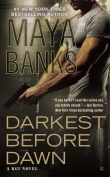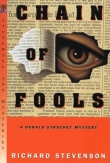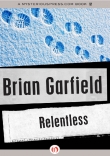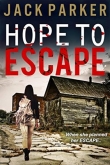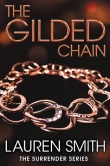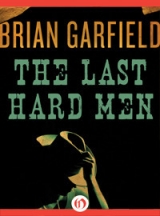
Текст книги "The Last Hard Men"
Автор книги: Brian Garfield
сообщить о нарушении
Текущая страница: 2 (всего у книги 12 страниц)

Two

Sam Burgade waited on the wooden curb for a steam automobile to pitch by. He waited a while longer, until the dust from its passage had settled back down onto the unpaved surface of Meyer Avenue, and then he stepped down into the powder and walked across the intersection to J. S. Mansfield’s new depot. By the time he got there, his boots had a fine film of silver dust on them, but underneath you could still make out the gloss of expensive leather.
The clerk greeted him by name, with respect, and asked after Susan, and remarked it was going to be a scorcher, and Sam Burgade nodded and said Susan was fine and yes indeed it wasn’t much for wet but it was all hell for hot. After this ritual, the clerk got out Burgade’s reserved copy of the morning Star and gravely accepted Burgades five-cent piece in his palm, and Burgade went up the length of the block and across the street into the dim cool lobby of Orndorff’s Cosmopolitan Hotel.
His crinkly outdoor eyes squinted against the dimness. He picked at the white shirt-front under his suit coat, pulling it away from his damp chest, and tipped his black hat back to cool his brow, and walked to his regular stuffed armchair by the front window. Maggie the waitress was just straightening up, having set down his saucer and cup of hot black coffee, and when she turned, sweeping a stray strand of colorless hair back from her face, she smiled and said, “Right on time, Mr. Burgade.”
“Morning, Maggie.”
She went away toward the kitchen, smiling fondly, perhaps because she liked him, perhaps because he tipped her dependably at the end of each month when he paid his $1.50 bill for coffee and whatever bills he had run up in the saloon bar.
By the Seth Thomas clock over the registry it was seven thirty. Sam Burgade, bored, settled his elbows on the arms of the chair, crossed his legs, laid the newspaper across his upended knee, and reached for his coffee without looking at it. As he ran his eyes over the various front-page adverts and headlines, he kept glancing up to see if anybody he knew had come into the lobby.
The headlines were dispassionate and dull.
CARRANZA REVOLT GATHERS FORCE
IN MEXICO.
BALKAN WAR DISPATCHES:
BULGARIA ATTACKS SERBO-GREEK
POSITIONS.
RUMANIA AND TURKEY ENTER WAR
AGAINST BULGARIA.
GOV. GEORGE P. HUNT ANNOUNCES
ARIZ.
1912 COPPER OUTPUT REACHED
200,000 TONS.
PRESIDENT WILSON PROPOSES
FEDERAL RESERVE BANK SYSTEM.
SOLONS LODGE OBJECTIONS TO NEW
FEDERAL INCOME TAX.
NEW ELECTORAL REFORM LAW IN
EGYPT.
Sam Burgade swallowed a yawn, and some coffee, and blinked, and then his eyes fell on the two-column item near the bottom corner of the page:
PRISON BREAK AT YUMA: TWO
GUARDS MURDERED,
CONVICTS ESCAPE. FOURTEEN
DESPERATE MEN STILL
AT LARGE. LATEST DISPATCHES
BY TELEPHONE.
His instincts and interests stirred, he folded the paper to read the article. He took the reading glasses out of their pocket case and wiped them with methodical deliberation, hooked them over one ear at a time, and settled down to read.
Sam Burgade was a striking man, a straight-backed long-legged figure with thick white hair, deeply tanned saddle-leather face, hand-tailored black business suit, old-style wing collar and cravat, glossy black walking boots. He wore his white hair bushy at the back, in a mane. Deep creases, knotted muscularly, ran like painful wounds from the nostrils to the lip-corners of his seamed brown face. All his bones were long; he was lean, but his chest hadn’t caved in with age. Eyes were the color of quicksilver, slotted between sun-shuttered lids. He was an old man now, sixty-one, but folks still said there was moss growing down his north side. Not that it mattered much what folks said. Sam Burgade was an anachronism, all used up. There wasn’t much call for overage ex-fighting men. With the help of rich acquaintances for whom he had done work in the old days—railroad bosses, bankers, corporate managers of big stock ranches—he had run his savings and pension up into a tidy sum for his old age, but clipping coupons and living in comfort didn’t make up for the boredom.
When he got up to shave each morning he was a little startled: he still expected to see a young face staring back at him out of the mirror. He didn’t feel old. It didn’t seem so long ago he had ridden scout for Crook in the campaigns against Geronimo. Hired on with the railroad to head up their train-robber-busting crew. Gone to work for the Inca Land and Cattle Company to demolish the hole-in-the-wall outlaw towns of Jack-Mormon rustlers that made an industry out of stealing beef by the herd from the Hatchet and the Arrowhead. Headed up the Arizona Territorial Police from 1902 to 1910. Organized the militia march into Bisbee to knock the steam out of the strikers’ bombings and assassinations at the great open-pit copper mines. Stumped for George Hunt in the campaign for Arizona’s first governorship after statehood.
That was just last year, that campaign. But when he’d got up to make speeches the crowd had treated him like an elder statesman—courteous respect, but inattention. Look at that poor old man, son, he used to be the toughest son of a bitch in Arizona, but that was before your time, that was in the Old Days.
Life had settled into dreary ritual. Mornings in the hotel, afternoons sitting on the sheriffs front porch or playing horseshoes with the old boys who’d soon move into the Pioneers’ Home, evenings in the genteel rubbed-oak-and-leather dimness of the Stockmen’s Club, reminiscing about Old Times with other old-timers.
Sam Burgade was in a mood all the time now, he didn’t care anymore one way or the other: a why-not mood of indifference. Nothing mattered very much. The century had turned thirteen years ago and Sam Burgade did not belong in this new one.…
The newspaper story took him back. It was Zach Provo’s name that did it. My God, I thought he was dead. Then he thought about it and did some arithmetic in his head, and realized Provo wasn’t all that old, after all. Provo had been almost a kid when Sam Burgade ran him to earth in 1885. Provo didn’t have to be much over fifty years old, even now. Think of that. Still a young man, after having spent three fifths of his life in the Yuma Penitentiary. What did a man feel like, busting out into this newfangled world after all that time?
It didn’t matter much, he supposed. They’d have Provo back soon enough. Not like the old days. In these modern times nobody could outrun the telephone and the horseless carriage, the railroads, the telegraph all over the place. The state militia up in Phoenix was even trying out one of those new flying machines.
No point fretting about Provo, anyway. Provo had got less than he deserved. He should have been hanged in the first place. He would have been, if he’d been tried by a cow-country jury instead of a crowd of city men in Phoenix who’d become soft where they sat and soft where they did their thinking. And that high-priced defense attorney pleading with the jury to take into account that Provo had already suffered grievously, been shot to pieces and had his young wife killed before his eyes: Provo had already been punished, the lawyer kept saying. He’s already paid a good part of the price for whatever crimes you may decide he committed, although nobody’s admitting he blew up that express car with the four men inside it; after all, this big-time railroad detective, this famous Samuel Burgade, searched every foot of the ground and every hiding place along the Navajo track line, and every inch of Defendant Provo’s homestead, and never found nary a trace of that forty-eight thousand dollars in gold that my client’s supposed to have stolen from that train.…
“Hot enough for you, Sam?”
Gus Leggett’s abrasive voice brought him out of his reverie. He looked up in resignation: Gus Leggett was the town bore. But Gus was also the accountant who had invested Burgade’s money for him, mostly on the advice of Burgade’s former employers, and Gus was good-hearted.
“Hot enough,” Burgade said judiciously, and Gus seemed to take it as sufficient invitation. Gus pulled up a chair and sat down.
“I see you’ve been reading the paper.” Gus had a narrow body, thinning blond hair, the rheumy eyes of a bloodhound, and an infuriating tendency to chuckle at everything he said—a nervous habit; every sentence ended with an awkward, neighing laugh.
Gus beamed. “Funny thing about old Zach Provo, isn’t it? You’re the one who captured him way back in the Dark Ages, aren’t you, heh? I hear they captured that bunch in the farmhouse downriver from Quartzsite, but there’s still nine at large, and Provo’s one of them, heh. What do you think of that, now?”
“They’ll get run down. They always do.”
“Maybe they got across into Mexico by now, what do you think, heh?”
“Maybe they did.”
“Not like the old days when you and the Rurales had to make a private deal because there wasn’t any extradition treaty between the States and Mexico. You ever wish it was the old days again, Sam?”
“No,” he lied.
His unenthusiastic monosyllables finally penetrated Gus’s awareness, and Gus stood up. “Well,” Gus said, and trailed off, and started again, “Well, I got to get up to the office, lot of work to do these days. Things are booming all over. You ought to stop up sometime and we can go over your portfolio, heh.”
“I’ll do that.”
Gus went, hobbling a little; a colt had stomped his foot once, he had lost a toe, and after that he had taken up desk work. He hated horses—“One end bites and the other kicks”—and hadn’t ridden one in thirty years. But then, Burgade thought, How long since I got aboard a horse? Last year, the statehood parade. He couldn’t remember a time since then.
He looked at the paper again and then, with sudden resolve, stood up and marched out onto the boardwalk, full of dignity, with the folded newspaper under his arm. He tugged his hat down and walked around the corner, where a blast of dry hot wind struck him across the quarter; tucked his face toward his shoulder and let the wind blow him down the street past the old, disused whipping post to the courthouse.
God had made Sheriff Noel Nye as ugly as He could and then hit him in the face with a shovel. Nye had arrived in Tucson twenty years ago like a whipped dog, a down-at-the-heels Nebraskan with one bad lung. Burgade had taken him on to do desk work and run chores. Nye had followed him onto the Territorial Police, learned the work diligently, grown robust in health, made headlines by shooting it out with one of the Clanton offshoot gangs, and got elected sheriff of Pima County on a wave of hero-worship. He had kept the job through subsequent elections by maintaining a superb record of peace-keeping, arrests, and convictions. Nye was loud and blasphemous; shaggy and folksy and garrulous on the surface, but in fact he was whip-smart. The long hair fell all over his malformed face in an effort to conceal the cauliflowered ears and forceps-elongated head; it exposed the squashed pug nose and the long pointed chin. The eyes were good eyes, warm, intelligent, the color of rusty iron.
Nye got up and came around the desk to welcome him. “Hot damn. Good to see you, Captain. Come on in and set.” Nye had called Burgade “Captain” since the Territorial Police days.
“I don’t mean to take up your time, Noel.” Burgade stood stiffly, embarrassed by the knowledge that he had no official capacity here any longer. The sad realization tended to emphasize his austere demeanor; he was distant and aloof anyway, it had always been difficult for him to establish close human contacts—his closest friends were all dead and he had not made new ones. Only Burgade’s daughter, Susan, remained inside the defensive shell.
Nye said impatiently, “I always got time for you, Goddamnit—hell, Captain, I owe you everythang I–”
“That’s neither here nor there. You’ve got work to do and if I’m in the way, just–”
“Balls. Shut up and set yoseff down, y’hear? Christ, the way you take on, Captain, you’d think you was the fucking town drunk or something. You don’t never need apologize to me.”
Burgade turned the chair and sat down, at attention.
“I guess you been readin’ about Zach Provo bustin’ out of Yuma.”
“Yes. That’s why I came. Any more word?”
“Not a whisper. That half-breed’s like some kind of mirage. Him and eight others, includin’ that Mixican Cesar Menendez, you recall it was him burnt down the Santa Cruz jail. Them two make a mean cock-suckin’ pair.”
Burgade had the newspaper open on his lap. He adjusted his reading glasses and ran his finger down the page. “Gant, Quesada, Weed, Shiraz, Riva, Tucker, Shelby. I remember two or three of them.”
“Some of ’em most lakly come along after your time,” Nye said, and immediately clamped his mouth shut as if he had said the wrong thing.
“Likely,” Burgade drawled evenly. “Look, Noel, Yuma’s a long way from your jurisdiction, but I had a few thoughts on this. I guess I knew Zach Provo as well as anybody at one time.”
Nye sat back. He wore a bowler hat. It was his office hat. When he went outside he always changed hats, put on an olive-drab flat-brimmed Army hat with four dents in the crown. He pushed the bowler onto the back of his head and said, “I’ll be obliged to hear it, Captain.”
“I remember Quesada and Lee Roy Tucker. Tough enough, but hot long on brains. If they had split up by themselves they’d have been caught by now. Gant and George Weed, maybe they’re smart enough to stay out of sight. I can’t speak for the others listed here. But Quesada and Tucker, they’d have fallen into the net by now if they were on their own.”
“I think I follow your meanin’, Captain, but go on.”
“Two guards dead means two guns missing. Did either gun turn up among the convicts they’ve recaptured?”
“No. We got a telegraph ware on that. Armed and dangerous. Ain’t neither gun showed up. They was riot guns, by the way, big motherfuckin’ twelve-gauges, pump-slides.”
“Then it’s damn good odds Zach Provo has got at least one of those guns.”
“Uh-huh. And lakly Menendez got the othern.”
“Possibly. My point is, the rest of those convicts aren’t armed. They wouldn’t have a prayer by themselves. They’re probably sticking close to Provo.”
“Sure. Lak you say, if they wasn’t all stuck together in one bunch, we’d have run a few of ’em down by now.”
“Nine men in a bunch, sticking together. That suggest anything to you, Noel?”
“Sure. I’m catching up on you, Captain. Nine men, you got to feed them, you got to get transpo’t for them, you got to get them clothes.”’
“And guns,” Burgade said. “They’ll have to hit someplace where they can get enough guns to equip everybody.”
“In other words, they ain’t hiding out in the sticks someplace. They got to head for a town.”
“Pretty soon they do. Or a big ranch, but that’s less likely—too many tough men around a working ranch, and too much chance of running into armed resistance. No. They’ve got to raid a town. They’ve only got two guns now, and not much ammunition, so they can’t hold a whole town up at gunpoint. They’ll go in at night, on the sly. Try to break into a gun store and a drygoods and a food store. Get themselves outfitted and then steal horses out of a livery stable.”
“You’re dead right, Captain. Ain’t but one way for them to do it. Of course, it could be any town between here and California, on this side of the Border or down below in Mexico.”
“No. We can narrow that down a lot more than that. They had to use the railroad, Noel. Either that or they’re still in Yuma.”
Nye sat bolt upright. “Railroad? But they done searched ever’ car on ever’ train in and out of Yuma.”
“Then they’re still in Yuma, holed up. Or they hid somewhere on a train where nobody found them. Either way, it narrows down. West of Yuma in California what have they got? Calexico, San Diego. East of Yuma they’ve got Gila Bend, Phoenix Junction, on up toward Flagstaff or down this way—Tucson, Benson, Lordsburg, El Paso. But I doubt they’d go as far as El Paso on a train. Too risky, and they’d be too nervous to stay put on a train that long.”
“Then what you figure? Calexico? Right on the Border, might be the most lakly bet. Easy to crawl acrosst to Mixico.”
“I doubt it. They couldn’t go anywhere from there. It’s isolated. Sand-dune desert on one side and Baja California to the south—nothing down there but rocks and cactus, they’d die of thirst in that country. No. Either they went all the way to San Diego, which is doubtful, or they came east into Arizona.”
Nye scowled at him. Nye liked to bake his opinions in a slow oven before serving them up. Now he said, “Maybe you going a little too faist. How do we know they on a train?”
“Because they’ve been using dogs to track them. They’d have turned up by now if they were still on foot.”
“Two rivers down there, Captain—the Gila and the Colorado. Dogs can’t follow them in a river.”
“The Gila’s dried up. The Colorado—they couldn’t move upstream against that current, and if they moved downstream much past Yuma they’d get swept up in the tidal bore and drowned.”
“You got it all pieced out, ain’t you? Jesus, I forgot how faist your mind works, Captain.”
“Then think about this. Most likely they got aboard a train. Most likely it was eastbound. Most likely they’re all in a tidy bunch that ought to be fairly easy to pin down, only two shotguns among them. The first train into Tucson from Yuma is about due into the yards—you’ve got about fifteen minutes to meet it, Noel, if you want to try it.”
Nye’s grin split his ugly face wide. He stood up in a single motion, tossing his bowler on the desk and reaching for his campaign hat. “Grab yoseff up that rifle there, Captain, and come on.”
Nye summoned three deputies from the wardroom on the way out of the courthouse. They commandeered the chain-driven water truck and went gnashing and bumping down to the railroad yards at a reckless speed of twenty-five miles an hour, scattering pedestrians and terrorizing horses in the streets. Burgade stood on one of the steel foot tabs alongside the sprinkler tank, like a fireman, one hand tight on the hand grip and the other, in which he carried the rifle, holding his hat on against the wind. For the first time in a year he felt eager about something.
His energy quickly dissipated in the heat and disappointment. They prowled the train with deliberate care, infuriating the engineer, who howled about the delay and insisted he had a timetable to keep. Nye said, “You just hold onto your fucking horses and leave when I tell you you can leave.” They started with the caboose and went through every car. The engineer went petulantly along to the dispatcher’s and complained about the delay, whereupon five railroad yard guards were sent along to help speed up the search, but still it was almost half an hour before Nye and Burgade got near the front of the half-mile-long freight and found the icebox car with its door a foot open.
Nye sent two deputies in first, guns up, and one of them came back to the door after a moment holding his nose expressively. “Sun sure got to this here meat, Sheriff, but ain’t no sign of nobody in here.”
Burgade said, “Let me have a look. Give me a boost up, Noel.”
Nye cupped his interlaced hands into a stirrup and gave him a leg up. Burgade felt stiff in his joints. He stopped just inside the car to accustom his eyes to the dimness, and made his way across the stinking rows of carcasses from corner to corner.
When he came back to the open door and blew out his lungs to clear his nostrils, he had in his hand a handkerchief he had removed from his hip pocket. The corner was stained.
Nye threw his head back. “What have you got up there?”
Burgade tossed the handkerchief down to him, said “Try a smell,” and sat down on the doorframe and eased himself to the ground. His bones felt brittle.
Nye said, “Smells like awl.”
“Light oil. Maybe gun oil.”
“Gun awl—sure, got to be.”
One of the deputies said, “How in hell’d he find that with all that beef blood all over the place?”
“Used my eyes,” Burgade said shortly. But secretly he was pleased with himself.
“Gun awl,” Nye said. “Like maybe from a riot gun.”
“They were here.” Burgade said. “I’d bet my shirt on it. They got inside at Yuma and hid behind the carcasses. After the train pulled out they shoved the ice blocks outside. You might find out if the Yuma patrols found any big puddles or new-dried mud along the right-of-way this side of Yuma. They were big blocks of ice—it’d take time to evaporate; if anybody comes across it before tomorrow morning it’ll probably still be damp.”
“Aeah,” Nye said slowly, working it all around in his brain. The disfigured face stirred. “Someplace between here and Yuma, they got off this train. How many towns along the line where they’d stop or slow down enough for men to jump off? Welton, Asher, Mohawk, Aztec, Sentinel, Theba, Gila Bend, Mobile, Casa Grande, Arizola, Toltec, Eloy, Picacho, Red Rock, Marana, Rillito, Cortaro, Jaynes, Tucson. I leave anything out?”
“Maricopa,” the deputy said. “And ain’t there a little post office this side of Asher a few mile—Tack Toe, somethin’ like that?”
“Tacna,” said Burgade. “Whistle-stop.”
Nye picked at a lower front tooth with a fingernail. “Lot of towns to cover. Some of them too small to have any local po-lice.” He poked his finger into the deputy’s chest. “You run up to the depot and get on that telephone, Buck. Alert ever’ town down the line from here to Yuma. Get aholt of Captain Rynning in Phoenix and the sheriffs in Pinal and Maricopa and Yuma counties. Tell ’em the convicts was on this train.”
Burgade walked back across town with the sheriff. Over past the Presidio Hotel and down Congress Street, with the morning sun hot on the backs of their shoulders. A light traffic of vehicles and horses fogged the air with dust. Burgade carried the rifle in one fist and drew curious glances from passersby. He muttered, “Think ahead. Think like them.”
“What’s that, Captain?”
He lifted his voice. “What’s their next move, Noel?”
“Hell, they git outfitted, they could head just about any which way.”
“Maybe. But Provo won’t just head them out into the desert. He’s too smart for that. Too easy to track out there. Somewhere they dropped off that freight. If it was before sunup—one of those towns down the Gila—they’re gone from there by now. If it was nearer this end of the line they’ll hole up till dark. Either way, they’ll get guns, food, clothes, horses. They’ll rob a few tills in whatever town they picked and they’ll get a little pocket money that way, but I doubt there’s enough loose cash in any of those towns to satisfy Zach Provo. He never did feel comfortable without a fortune tucked into his britches.”
“Supposedly he’s still got that gold he stole off the Santa Fe Railroad. You never did fand it.”
“That gold’s got to be way up past the Mogollon Rim somewhere. Navajo country. That’s a hell of a long way from the S.P. line.”
Nye replied with enough of a grunt to let Burgade know he was listening, without interrupting Burgade’s train of thought. They stepped down into the powder of Stone Avenue, went across and angled up Maiden Lane alleyway. Burgade was still musing out loud:
“Put yourself in Provo’s shoes.”
“Listen, I’m glad I ain’t in his shoes.”
“Think the way he thinks. He’s got eight toughs tagging along with him. He can’t afford to. split up now, because there’s too much risk one of them would get caught and lead us back to him. He’s got to keep them together. That means he’s got to have something to offer them.”
“Lak what?”
“Money.”
“Maybe I don’t follow you, Captain.”
They came along by the Metropolitan Saloon. “Buy you a beer, Noel?”
“Don’t mand if I do.”
The room was dim, full of dark wood furnishings and the lingering smell of tobacco and whiskey. A few men sat around in boots and cowboy hats. A big Indian-Cavalry battle scene painting behind the bar. Burgade bought beers and propped his rifle muzzle-up against the front face of the bar. Hooked his boot heel on the rail and leaned on one elbow with the unconscious practice of long habit and said, “Provo’s got to promise them something. Otherwise he can’t keep them together—he can’t keep his eye on that many of them twenty-four hours a day. If a man wants to get clear of the law and drop out of sight, it’s a lot easier to do with money. Buy good clothes that fit you right, pay for a Pullman compartment, stay over in expensive hotels—the law’s not going to be looking for them in places like that. Buy a first-class passage on a steamer for Shanghai or Sydney or Capetown, or take a train down to Galveston and ship out for Lisbon or Marseille. That’s the way to get free, but it takes money.”
“Go on, Captain.”
“Nine men. They’ve got to get their hands on a sizable pile of cash if it’s going to split nine ways and still look impressive. They won’t find that kind of money in the till of a general store in some whistle-stop. Provo’s got to come up with fifteen or twenty thousand dollars to make those convicts sit up and listen. Otherwise he loses them.”
“I’m startin’ to get your drift now.”
“Bait,” Burgade said. “Why not give them something to shoot for?”
“Spell it out, what you got in mand.”
“Suppose we set up a fake story about a big shipment of cash arriving in the Tucson bank from the Denver mint. Get the story on the front page of all the newspapers this afternoon and make sure the newspapers are delivered to every crossroads store and whistle-stop in southern Arizona.”
Nye chugged his beer down. The mug had left a wet ring on the bar. He set it down carefully on the ring. “I don’t know, Captain. Take the lid off that kand of honey jar and a lot of flies bound to come swarming around besides Zach Provo. We could end up with the whole town full of bank robbers.”
“When you use a net you’re bound to pull in a lot of innocent fish. If they’re too small you just throw them back in the water, Noel. And if they’re big enough and guilty enough then you’ve got a bonus.”
“Provo ain’t stupid. He sees some story about a big shipment of cash money, he’ll have to expect it’s gonna be protected. He might even figure it for a trap.”
“Naturally. So let’s give him a little extra bait. Put in the story that the money’s coming in—oh, say, Friday morning maybe, on an armed westbound train. That ought to give Provo time to see the story, a few days to get over here to Tucson and get his crowd set up for it. And put in the story that the money’s going to be trucked from the depot to the bank under guard. With me heading up the guard detail.”
“You?”
Burgade finished his beer and ascetically cleaned the foam from his lips with a bar napkin. “Me. I’m the man killed Zach Provo’s wife. I doubt that’s slipped his mind. Quite the reverse. I imagine he’s had nothing to brood about except that, and nothing much to do except brood about it. Offer Zach Provo a chance to kill me and he’ll jump at it.”
“Oh sure. And you’ll get dead. I don’t like the price of that, Captain.”
“I’ll have a little advantage, Noel. I’ll know he’s coming. I’ll be looking for him.”
“But you’re—” Nye didn’t finish the sentence and it was pretty clear what he had meant to say: But you’re an old man.
“I’ve handled Zach Provo before,” Burgade said stiffly. “I can do it again.”
“But it ain’t your job, Captain.”
“I’m offering to make it my job.” For God’s sake can’t you see how much I want this chance?
Nye stirred. He rubbed a hand abrasively over his ugly face. “I don’t know, Captain. I’ll have to thank on it.”
“Don’t take too long. The papers are going to press.”
“I don’t like it.”
“Provo’s too smart to get caught unless we bait him into it. You know that.”
“Aeah. Reckon I do. But I ain’t sure he’s worth catchin’ if it’s at the expense of your life.”
“Let me worry about that,” Sam Burgade said.
Nothing to do now but wait. Sweat it out and see if Provo swallowed the hook. Burgade walked home shortly before noon, taking his time in the heat. Big trees arched the street, throwing patterns of shade, and the stately old Spanish houses clung to a decaying dignity. The lawn in front of Burgade’s house looked parched. He went up the tile-bordered walk and let himself in; the screen door flapped shut behind him with a weatherbeaten slap. The thick adobe walls made it cooler inside.
The gun cabinet was in the front parlor, tall like a china cabinet; the windowed maple doors were not locked, but the guns inside were chained and padlocked, to discourage errant children. Burgade opened the doors and inspected the assortment. Some of the long guns went back a long way. The .45-70, he’d had that one with him when he’d cornered Zach Provo in his hogan.
No time to reminisce about that now. The Springfield .06 was likely the best all-around rifle in the rack, but it was a bolt-action, not fast enough for close-in work in town streets. He passed it by. Same for the Mannlicher. The Winchester .38-56 was too heavy, too long and ponderous. The .32-20 was a toy, a squirrel gun, no good for man-size targets.
It came down to the Marlin .30-30. Lever-action carbine, short barrel, light stock, not much for long-range work but easy to maneuver and quick to reload.
He unlocked the chain and took it down. Found four boxes of cartridges in the drawer, and after a moment’s thought unlocked the cabinet door beneath and dragged out the old holster-belt and the black metal lockbox. He put the lockbox on the dining table and put its key into it, flipped the lid back and poked through the oiled handguns inside. The Army .45 automatic was the newest of them, a carved gilt-inlaid beauty. Presented to him with much fanfare at the banquet when he’d retired from the Territorial Police. Like a gold watch, he thought. He’d never got the hang of shooting the thing: it didn’t point naturally, it kicked like a mule. Hard to hit the broad side of a barn from inside the barn. He put it back in the box and shuffled the others around. His favorite was the old .44 single-action, he’d carried that one on his hip nearly thirty years and the bluing was worn off to show for it. But old springs got brittle, like bones, and old firing pins tended to crystallize and shatter. Any piece of machinery that was too old and too much used was suspect: undependable.

